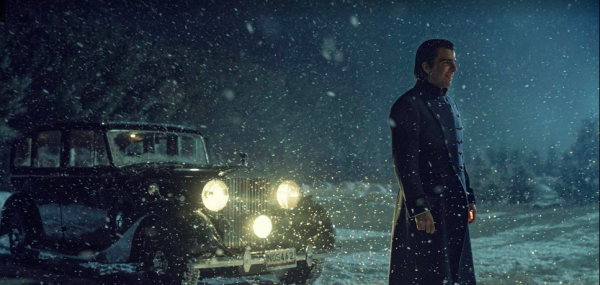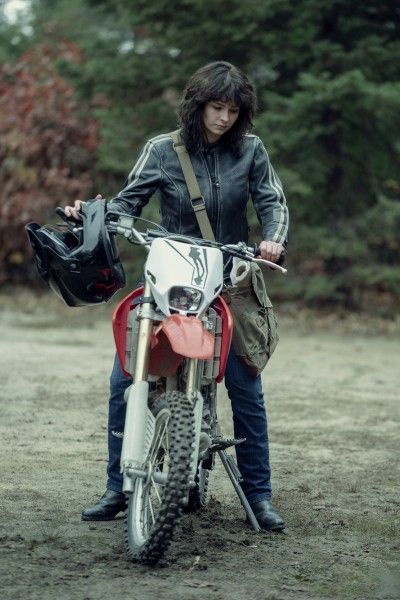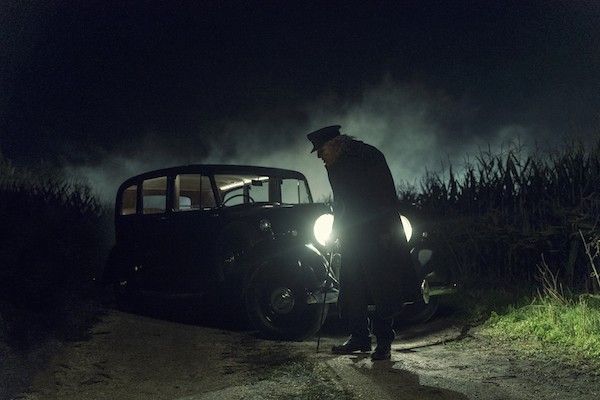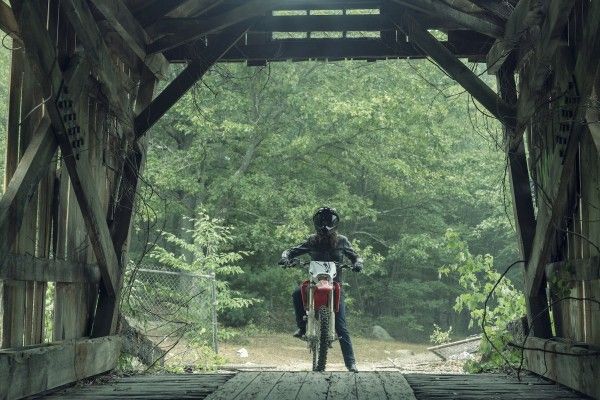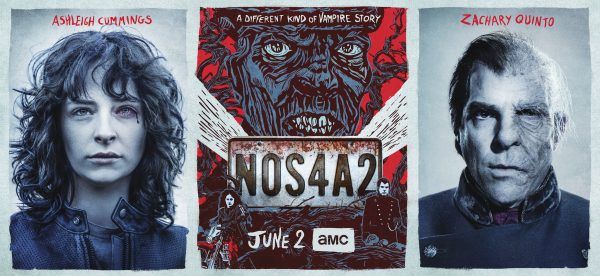Based on the novel by Joe Hill, AMC's NOS4A2 tells the terrifying story of Charlie Manx (Zachary Quinto), a ghoulish vampire of sorts who abducts the souls of children and brings them to Christmasland, a wintery hell where kids turn into razor-toothed gremlins and play an unspeakable violent game called "Scissors for the Drifter." After operating for centuries unopposed, Manx meets his match in Vic McQueen (Ashleigh Cummings), a New England teenager who discovers she has a supernatural ability to find lost things.
Before NOS4A2's premiere, I chatted with Joe Hill about what makes the idea of Christmas creepy, his role in the show, what horror adaptations often get wrong—especially adaptions of stories by his dad, Stephen King—how important dialogue is to building a character, and the on-set moment where he felt like he was walking into his own memories.
Before we get into the show itself, I'm wondering, overall, why Christmas? Is there something innately scary about Christmas to you, or is it more of a dynamic between something that seems innocent but is not?
JOE HILL: Well, you know, you've got all these right-wing TV blowhards who are, "Ah, there's a war on Christmas!" I got so sick of hearing it I said, "You guys ain't seen nothing yet. I'll give you a war on Christmas." [laughs]. No, the thing is, the way good horror operates is it ruthlessly hunts out all the stuff that we love and trust and which we find reassuring, and then it rips the carpet out from under it. Lon Chaney had this great line, I love it, I quote it all the time, he said, "There's nothing funny about a clown at midnight." You think about Christmas and you hear Christmas music in November, it puts you in that mood for a cup of eggnog, to sit next to the Christmas tree. But if it's middle of the summer and you're out for a hike, and you're a little bit turned around and a little bit lost, and you come across an old shack in the woods, the windows are all boarded up, and you can hear the hum of flies, and there's Christmas music wavering from inside the house. You're gonna' turn around and head in the other direction. You're gonna beat feet just about as fast as you can. Because that's wrong. There's just something not right about that picture.
That's interesting because I think a lot of people were wondering why NOS4A2 was debuting in June and not, say, December.
HILL: Right, it's the jarring juxtaposition. The right thing at the wrong time.
In the adaptation process, what was your day-to-day involvement like? Was this the first time someone tried to adapt NOS4A2 or the first time it worked?
HILL: I made a really close study of how to succeed as an executive producer, because I'm an executive producer on this and I'm an executive producer on the Netflix adaptation of Locke & Keye. It seems to me that the real art of being executive producer largely consists of eating craft service and getting underfoot when people are trying to make a TV show. You score bonus points if you can walk through the shot talking on your cell phone while people are trying to film a really heartbreaking scene.
You get a pay bump on the check every time that happens.
HILL: Yes! Exactly. But AMC has their method, and it obviously works pretty well. In a lot of ways. AMC invented the game all the rest of us are playing. The whole idea of like, the novelistic possibilities of premium cable, all that stuff basically comes from Breaking Bad, Mad Men, and Walking Dead. Especially when it comes to stories of the uncanny. They have a track record with stuff like Walking Dead and The Terror, which was so great, the adaptation of the great Dan Simmons novel. They have their approach. They started working on NOS4A2 in 2015, and when I saw [show creator] Jami O'Brien's script for the first episode I just thought it was total gold. I was completely blown away, I thought it was one of the best scripts I'd ever read in my life. I felt right from the start the story was in very safe hands. We were working with someone who loved the book and also understood how to make it live on the screen. Because there is no perfect translation. Things that work on the page don't always work in a television show or a film. So whenever you run into one of those problems you have to look at them as opportunities. How can we make this even better or how can we make this exciting for TV?
Can you think of an example where that happened here?
HILL: In [the book], when we first meet my heroin Vic McQueen, she's just 10. She's discovering her supernatural powers. Well, if they'd done that in the TV show they'd have to have a child actress for a big chunk of the show and then switched over to Ashleigh Cummings. I think Jami decided, correctly, that you could compress years of Vic's supernatural discoveries into just a few episodes when Vic is already 18. I think that works really well.
Besides the obvious visual element, what do you think is the key part of making a book work as a TV show or film?
HILL: Probably one of the best adaptations I've ever seen would be IT: Chapter One. The reason it succeeds so well...a lot of people who have adapted stories by my dad have been able to make them scary. They've understood the scary element. What they've had a harder time with is capturing the warmth of a lot of those stories. My dad loves his heroes and his readers love those heroes and love spending time with them. Even when they go through terrible things you can't escape the feeling that the writer cares about them. You don't always feel that when you're watching the movies. Some of the movies you feel like what the director here cares about is scaring the bejeezus out of you, but the characters themselves are flatter. There's less feeling for them. When the stories have succeeded, a good cinematic adaptation, would be something like IT where Andy and Barb Muschietti love those characters and love the actors playing them. Even when terrible things happen to those characters, there's still that underlying warmth. So I guess I'm saying adaptations succeed when you capture the fullness of a creator's voice.
Is there any note that you might have given to Jami or Ashleigh that sticks out in your mind?
HILL: One thing I talked a lot about with Jami was voice. When I write a book, a lot of what I struggle with is exactly how a character talks. There is a thing John Steinbeck has a character say in Sweet Thursday, something like, "When I read a book and I hear a character talk, I want to know how that character dresses from the things they say." I'm a guy who has a lot of faith in good dialogue. If you can make dialogue that leaps off the page, if you can write good dialogue, you can paint the whole picture of a character. We talked about that some with the TV show. We talked about Charlie Manx. Charlie Manx is over 100 years old. He's a cunning old rogue vampire. I wanted to capture something of his antique language, that there's something about the way he speaks that's a little out of step with our times. For example, one point I think in episode 3, his Renfield, Bing Partridge (Ólafur Darri Ólafsson), grabs a little kid by the arm. Charlie shoves him back and says, "Never hurt the children, hell is not too hot for such men." There's something very 19th Century about that particular phrasing.
That level of detail is interesting because I feel like the horror of this show is more an underlying dread as opposed to constant jump scares. Was that specifically something you discussed or thought about?
HILL: I think horror is a deeply misunderstood genre that a lot of people think is fundamentally about sadism. That if you throw enough entrails at the camera, you have horror. Real horror is about falling in love with characters and then seeing them endure the worst, and then rooting for them to overcome the darkness. To get out of the basement, get away from the guy with the chainsaw. You can't have effective horror without also having characters to root for. I like that NOS4A2 gives us some characters to root for and dwells on their big supernatural and their smaller psychological and emotional, moral issues.
Obviously, when you write the book, it will never look exactly the way it looks in your head. Is there a moment whenever you do an adaptation where you sort of have to let go of that exact image in your head?
HILL: You know, I had sort of the opposite of that. I had a moment where I thought, "This is exactly the picture." In particular...so Vic has this supernatural ability to find lost things. She gets out there on her dirt bike and she can find her way to this old derelict covered bridge and that bridge spans the distance between lost and found. That bridge is based on an actual bridge, a covered bridge in Bangor, Maine that spans the Penobscot River. When I was 12 years old, my friends and I used to dare each other to ride our bikes across it. It was really scary because the thing was really ramshackle. If you looked down between the floorboards you could see the frothing river a hundred feet below. They tore it down when I was I think 13 or 14. But then I visited the set of NOS4A2 and goddamn, there it was again. The exact same bridge I used to ride my bike across. I could walk across it again and that was really jarring. It was like stepping into my own imagination. But it was also like stepping into my own memories.
One final thing: I'm wondering if you can confirm that whatever "Scissors For the Drifter" is, it's as unpleasant as it sounds.
HILL: You know, it's kind of like playing tag but you definitely don't want to be it.
NOS4A2 premieres on AMC Sunday, June 2.


